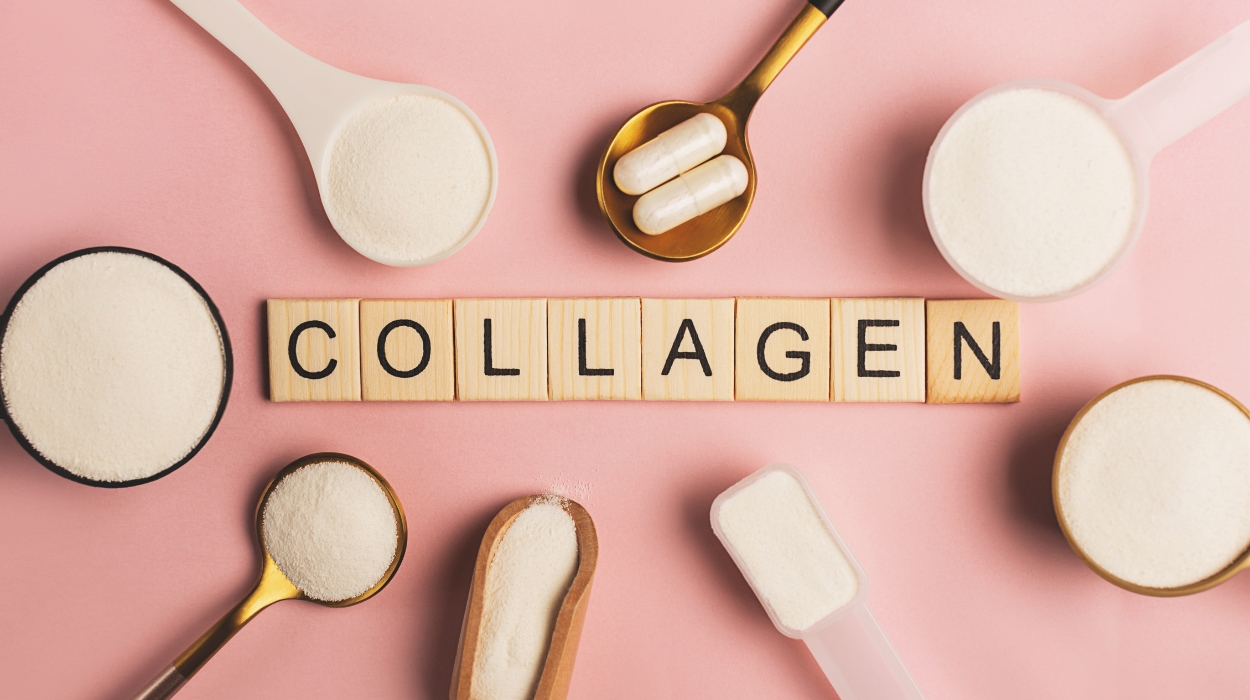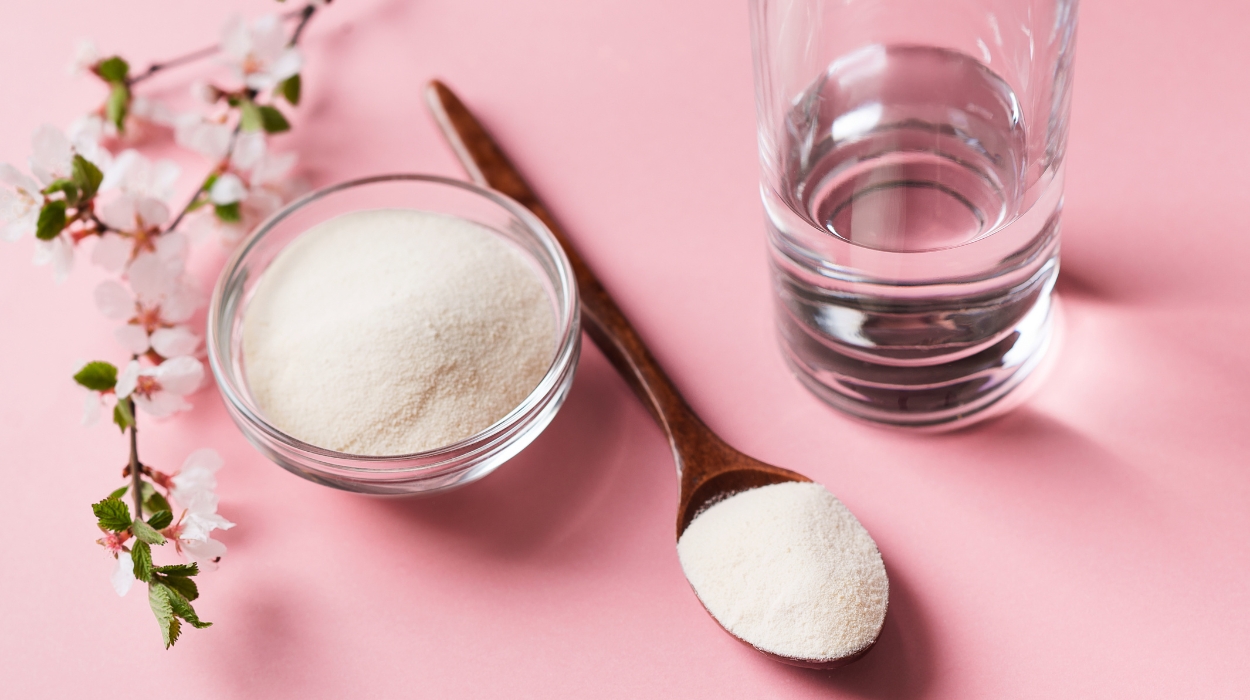 Expert's opinion
Expert's opinion
Expert's opinion
The article is a subjective view on this topic written by writers specializing in medical writing.
It may reflect on a personal journey surrounding struggles with an illness or medical condition, involve product comparisons, diet considerations, or other health-related opinions.
Although the view is entirely that of the writer, it is based on academic experiences and scientific research they have conducted; it is fact-checked by a team of degreed medical experts, and validated by sources attached to the article.
The numbers in parenthesis (1,2,3) will take you to clickable links to related scientific papers.
Does Collagen Help You Lose Weight? Here’s What Experts Say 2024

The world of health and wellness constantly evolves, and collagen peptide supplements have taken center stage in recent years. One of the claims of collagen’s health benefits is collagen can help lose weight. The hypothesis is that it can help you reduce body fat while maintaining lean muscle mass. Collagen is a protein peptide that makes up a significant portion of connective tissue in our bodies, including skin, bones, and muscles.
Collagen alone may not directly cause weight loss, but it can aid in healthy weight management. Collagen may promote satiety, which helps reduce cravings and calorie intake. It may also preserve your muscle mass during weight loss, which helps maintain a healthy metabolism. Additionally, collagen supports digestion and gut health, which can impact weight management and blood sugar control.
While there is limited research, we will explore the question, “Does collagen help you lose weight?” as well as the potential benefits of collagen supplementation for your weight loss journey and whether you should incorporate it into your healthy diet and fitness routine.
Does Collagen Help With Weight Loss?
Collagen is a protein peptide found in the body and is an increasingly popular supplement for skin, hair, joint health, and even weight loss. While collagen alone may not directly cause weight loss, it can aid in weight management. Collagen may promote satiety, which helps reduce cravings and calorie intake. It also preserves muscle mass during weight loss, which helps maintain a healthy metabolism. Collagen also supports digestion and gut health, which impacts weight management and blood sugar control. However, collagen should be used with a balanced diet and exercise routine for optimal weight loss.
What Is Collagen?
Collagen[1] is the most abundant protein in the human body, making up approximately one-third of our total protein. It is a vital component of connective tissues such as skin, bones, tendons, ligaments, and cartilage, providing strength, elasticity, and support to these structures.
Collagen also exists in other body parts, including blood vessels, corneas, and the gut. There are five common types of collagen known from Type I to Type V.[2] These categories are based on where the collagen is abundantly located in the human body. For instance, Type I[3] is abundant in your skin, bones, tendons, and ligaments, making about 90% of your collagen.
The human body naturally facilitates collagen synthesis, but collagen production decreases with age. This leads to signs of aging, such as loss of skin elasticity that manifests as wrinkles, sagging skin, joint pain, and stiffness.
Collagen supplements, typically from animal byproducts such as cow hides or fish scales, are popular for their potential benefits to skin, hair, nails, and joint health.[4] These supplements are usually hydrolyzed collagen peptides, broken-down amino acids that the body can easily absorb and utilize. They can be in the form of liquid, soft gels, collagen capsules, or collagen powder.
While more research is needed to fully understand the benefits of consuming collagen peptide supplements fully, they are generally considered safe and can be easily incorporated into a healthy lifestyle.
How Can Collagen Help You Lose Weight?
Collagen may not be an immediate solution for promoting weight loss, but it can undoubtedly aid in the process. A recent 2023 study showed that certain collagen extracts effectively treated obesity[5] and the oxidative stress parameters associated with this inflammatory condition.
Collagen benefits are that it can promote weight loss through several mechanisms: it may increase satiety, retain muscle mass, and support gut health. Here is how:
Promotes Satiety

First, collagen is a protein, and proteins satisfy hunger better than carbohydrates or fat. Collagen peptides may help you feel fuller for longer and reduce overall calorie intake. However, newer information is contradictory, saying that collagen does not alter appetite[6] as opposed to older studies such as the one from 2009 that showed gelatin to reduce participants’ appetite.[7]
Clearly, further studies in humans are necessary to determine the true effect of collagen on appetite. Taking collagen supplements can support gut health and digestion,[8] impacting satiety by improving gut function. It may help you better absorb nutrients from your food and reduce cravings for unhealthy snacks.
Preserve Muscle Mass
Collagen supplements support weight loss by preserving lean body mass, which is critical for maintaining healthy body composition and metabolism. As you age, you lose muscle mass, making it harder to maintain a healthy weight. Collagen’s amino acids are vital for muscle growth and repair.[9]
Some specific collagen peptides may also reduce fat accumulation,[10] preserve joint health, and support resistance training efforts for muscle growth.[11]
Preserving lean mass is essential during weight loss because it helps maintain your metabolism and energy expenditure, allowing you to burn more calories and fat cells even at rest. Losing muscle mass can lead to a slower metabolism, making it harder to avoid weight gain.
By taking specific bioactive collagen peptides in collagen supplements and following a regular exercise routine, you can help preserve your skeletal muscle lean mass while reducing body fat. This can also improve your overall body composition and help you achieve your weight loss goals safely and healthily.
Supports Gut Health
Collagen is good for gut health as it supports digestion and reduces bloating[8] and acid reflux. It may also soothe and heal the intestinal lining[12] keeping conditions like leaky gut syndrome[13] and inflammatory bowel disease[14] at bay.
When your gut is healthy, your body can support the body’s overall metabolism, leading to improved weight management, more efficient nutrient absorption, and improved toxin elimination.
Additional Collagen Health Benefits

Besides weight loss, here are the additional collagen health benefits:
- Joint pain collagen supplements may help with joint pain relief by reducing osteoarthritic pain[15] and stiffness. With less stiffness, one can expend more calories by being active and exercising.
- Oral ingestion of low-molecular collagen peptides may promote skin elasticity[16] and skin hydration, reducing wrinkles and promoting a youthful appearance. Weight loss often causes sagging skin which can be demotivating to achieving further healthy weight loss goals and may cause low self-esteem.
- Collagen promotes hair and nail growth[17] and strength.
- Supports heart health by reducing arterial stiffness and improving blood flow. This may also promote the motivation to be more active and burn more calories.
- Collagen helps heal and protect the digestive tract, reducing inflammation, promoting gut health, and preventing estrogen deficiency-induced obesity.[18]
- Collagen is essential for blood clotting[19] and vascular health. A healthy heart is essential to maintaining an active lifestyle which promotes weight loss.
Should We Take Collagen Supplements?
Whether or not to take collagen supplements is a personal choice; you should base your decision on your needs and preferences. While your body naturally produces collagen, this production decreases as you age, making supplementation a viable option.
Collagen dietary supplements may provide various health benefits, from promoting joint health and healthy skin elasticity to improving digestion, vascular health, and immune function against estrogen deficiency-induced obesity. Collagen intake may also help you lose weight by reducing fat accumulation and increasing muscle mass.
Collagen-rich foods like bone broth can help promote weight loss. However, collagen should be viewed as one piece of a healthy lifestyle puzzle block that complements a balanced diet, along with regular exercise and good sleep hygiene.
Are There Any Side Effects?
Mild digestive discomforts such as bloating, gas, and upset stomach are common with too much collagen consumption. You can minimize these side effects by starting with a lower dose and gradually increasing oral ingestion.
If you have an allergic reaction to specific sources of collagen, you should avoid any collagen peptides derived from those sources. Check the label for the source of the collagen peptide.
How To Use Collagen For Weight Loss Safely?
For collagen consumption for weight loss to be safe, start with a lower dose and gradually increase as tolerated to minimize digestive discomfort. Secondly, only buy the best collagen for weight loss supplements that are high-quality and derived from sources safe for your allergies or dietary restrictions.
Third, ensure you incorporate foods rich in essential nutrients such as vitamin C, zinc, and protein to boost natural collagen synthesis. A simple treat would be adding collagen protein powder to a smoothie with any citrus fruit for vitamin C and nuts and seeds as toppings for zinc.
It’s also important to stay hydrated and avoid relying solely on collagen supplements for weight reduction.
The Takeaway
A collagen-rich diet supported by high-quality collagen supplements can be a helpful tool for losing weight and improving overall health. Collagen protein is a potentially satiating nutrient, plus thanks to its high amino acid content, it also supports muscle growth and repair. This helps you maintain lean body mass and a healthy metabolism. It may also support gut health, which, in turn, supports healthy glucose metabolism.
With these considerations in mind, collagen can be a valuable addition to a comprehensive approach offering tangible weight loss benefits.
+ 19 sources
Health Canal avoids using tertiary references. We have strict sourcing guidelines and rely on peer-reviewed studies, academic researches from medical associations and institutions. To ensure the accuracy of articles in Health Canal, you can read more about the editorial process here
- Medlineplus.gov. (2019). Collagen Peptides: MedlinePlus Supplements. [online] Available at: https://medlineplus.gov/druginfo/natural/1606.html.
- Shenoy, M.M., Nishath Sayed Abdul, Qamar, Z., Bahri, A., Ghalayini, A. and Ateet Kakti (2022). Collagen Structure, Synthesis, and Its Applications: A Systematic Review. Cureus. [online] doi:https://doi.org/10.7759/cureus.24856.
- Naomi, R., Pauzi Muhd Ridzuan and Hasnah Bahari (2021). Current Insights into Collagen Type I. Polymers, [online] 13(16), pp.2642–2642. doi:https://doi.org/10.3390/polym13162642.
- Bianchi, F.M., Angelinetta, C., Rizzi, G., Praticò, A. and Villa, R. (2022). Evaluation of the Efficacy of a Hydrolyzed Collagen Supplement for Improving Skin Moisturization, Smoothness, and Wrinkles. The Journal of clinical and aesthetic dermatology, [online] 15(3), pp.48–52. Available at: https://www.ncbi.nlm.nih.gov/pmc/articles/PMC8944283/.
- Nataliia Raksha, Tetiana Halenova, Vovk, T., Olexandra Kostyuk, Synelnyk, T., Andriichuk, T., Tetiana Maievska, Savchuk, O. and Li, O. (2023). Anti-obesity effect of collagen peptides obtained from Diplulmaris antarctica, a jellyfish of the Antarctic region. Croatian Medical Journal, [online] 64(1), pp.21–28. doi:https://doi.org/10.3325/cmj.2023.64.21.
- Giovanna Gonçalves Duarte, de, V., Ana C.B. Marini, Giglio, B.M., Renata Sieiro Fernandes, Leal, P. and Pimentel, G.D. (2021). Acute supplementation with whey protein or collagen does not alter appetite in healthy women: a randomised double-blind and crossover pilot study. British Journal of Nutrition, [online] 128(2), pp.345–351. doi:https://doi.org/10.1017/s0007114521003160.
- Ananda Hochstenbach-Waelen, Westerterp-Plantenga, M.S., Margriet A. B. Veldhorst and Westerterp, K.R. (2009). Single-Protein Casein and Gelatin Diets Affect Energy Expenditure Similarly but Substrate Balance and Appetite Differently in Adults 1–3. Journal of Nutrition, [online] 139(12), pp.2285–2292. doi:https://doi.org/10.3945/jn.109.110403.
- Abrahams, M., Rochez O’Grady II and Janne Prawitt (2022). Feasibility and acceptability of a mixed model digital study to explore the effect of a daily collagen peptide supplement on digestive symptoms in healthy females: findings from a pilot study. (Preprint). JMIR formative research. [online] doi:https://doi.org/10.2196/36339.
- Khatri, M., Naughton, R.J., Clifford, T., Harper, L.D. and Liam David Corr (2021). The effects of collagen peptide supplementation on body composition, collagen synthesis, and recovery from joint injury and exercise: a systematic review. Amino Acids, [online] 53(10), pp.1493–1506. doi:https://doi.org/10.1007/s00726-021-03072-x.
- Woo, M., Yeong Wook Song, Kang, K.-H. and Jeong Sook Noh (2018). Anti-Obesity Effects of Collagen Peptide Derived from Skate (Raja kenojei) Skin Through Regulation of Lipid Metabolism. Marine Drugs, [online] 16(9), pp.306–306. doi:https://doi.org/10.3390/md16090306.
- Oertzen-Hagemann, V., Kirmse, M., Eggers, B., Pfeiffer, K., Marcus, K., Markus de Marées and Platen, P. (2019). Effects of 12 Weeks of Hypertrophy Resistance Exercise Training Combined with Collagen Peptide Supplementation on the Skeletal Muscle Proteome in Recreationally Active Men. Nutrients, [online] 11(5), pp.1072–1072. doi:https://doi.org/10.3390/nu11051072.
- Chen, Q., Chen, O., Isabela Mateus Martins, Hou, H., Zhao, X., Blumberg, J.B. and Li, B. (2017). Collagen peptides ameliorate intestinal epithelial barrier dysfunction in immunostimulatory Caco-2 cell monolayers via enhancing tight junctions. Food & Function, [online] 8(3), pp.1144–1151. doi:https://doi.org/10.1039/c6fo01347c.
- Haruki Usuda, Okamoto, T. and Wada, K. (2021). Leaky Gut: Effect of Dietary Fiber and Fats on Microbiome and Intestinal Barrier. International Journal of Molecular Sciences, [online] 22(14), pp.7613–7613. doi:https://doi.org/10.3390/ijms22147613.
- Fakhoury, M., Negrulj, R., Armin Mooranian and Hani Al-Salami (2014). Inflammatory bowel disease: clinical aspects and treatments. Journal of Inflammation Research, [online] pp.113–113. doi:https://doi.org/10.2147/jir.s65979.
- Juan Mario García-Coronado, Martínez-Olvera, L., Rodrigo Enrique Elizondo-Omaña, Acosta-Olivo, C., Félix Vilchez-Cavazos, Simental-Mendía, L.E. and Simental-Mendía, M. (2019). Effect of collagen supplementation on osteoarthritis symptoms: a meta-analysis of randomized placebo-controlled trials. International Orthopaedics, [online] 43(3), pp.531–538. doi:https://doi.org/10.1007/s00264-018-4211-5.
- Kim, J.-M., Sang Yup Lee, Lee, J., Choi, S., Suk, J., Lee, J., Joo Hwan Yang, Joo Hwan Yang and Kim, J. (2022). Oral Supplementation of Low-Molecular-Weight Collagen Peptides Reduces Skin Wrinkles and Improves Biophysical Properties of Skin: A Randomized, Double-Blinded, Placebo-Controlled Study. Journal of Medicinal Food, [online] 25(12), pp.1146–1154. doi:https://doi.org/10.1089/jmf.2022.k.0097.
- Hexsel, D., Zague, V., Schunck, M., Siega, C., Camozzato, F. and Steffen Oesser (2017). Oral supplementation with specific bioactive collagen peptides improves nail growth and reduces symptoms of brittle nails. Journal of Cosmetic Dermatology, [online] 16(4), pp.520–526. doi:https://doi.org/10.1111/jocd.12393.
- Chiang, T.-I., Chang, I-Chang., Hsueh Yun Lee, Hsieh, K., Chiu, Y.-H., Lai, T.-J., Jer Yuh Liu, Hsu, L.-S. and Kao, S.-H. (2016). Amelioration of estrogen deficiency-induced obesity by collagen hydrolysate. International Journal of Medical Sciences, [online] 13(11), pp.853–857. doi:https://doi.org/10.7150/ijms.16706.
- Cooley, B.C. (2013). Collagen-induced thrombosis in murine arteries and veins. Thrombosis Research, [online] 131(1), pp.49–54. doi:https://doi.org/10.1016/j.thromres.2012.09.019.



